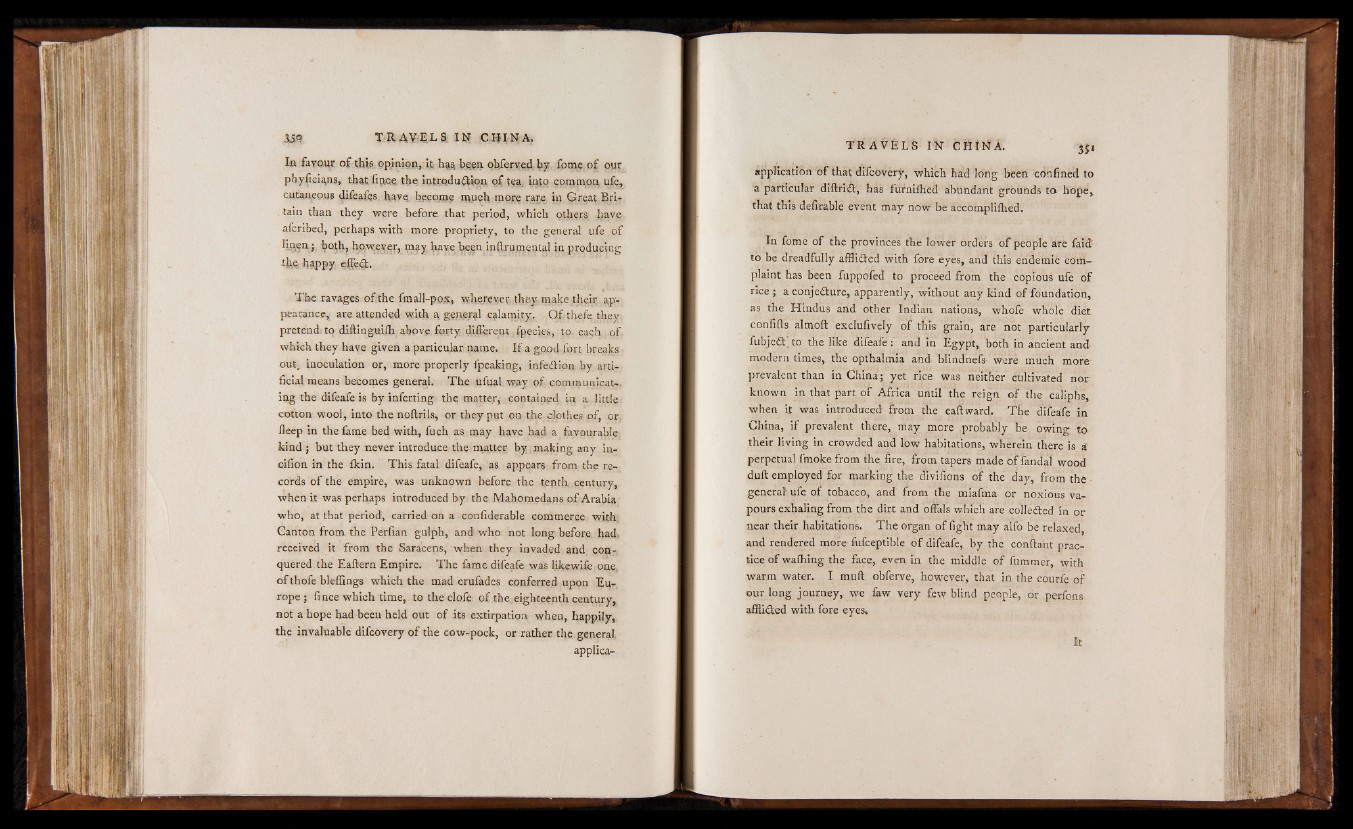
In favour. o f this, op,inign,it has been okferved by ip m e o f opr
phyfici^ns, that fiuce. the. introdudfion o f tea, in{q cprptnpEt ufq,
cutaneous difeafes have, become touch more rare in Great Britain
than they were before that period, which others have
afcribed, perhaps with more propriety, to the general ufe o f
'bojh, hqweyer, tnay h.ave.bqcninftrujpental in producing
tite happy effedt.
The ravages o f the fm all-post, whcreycr they make their appearance,
are attended with a general calamity. O f thcfc they
pretend: to diftinguiih above forty different fgeci.es, to each o f
which they have given a particular name. I f a good fort breaks
out, inoculation or, more properly fpeaking, infedfion by artificial
means becomes general. The ufual way o f coinmunicat-.
ing the difeafe is by inferring the matter, contained in a little
cotton wool, into the noftrils, or they put on the clothes, of, or:
fleep in the fame bed with, fuch as may have had a favourable
kind ; but they never introduce the matter by making any in-
oifion in the ikin. This fatal difeafe, as appears from the records
o f the empire, was unknown before the tenth, century,
when it was perhaps introduced by the Mabomedans o f Arabia
who, at that period, carried on a confiderable commerce with
Canton from the Perfian gulph, and who not long before, had,
received it from the Saracens, when they invaded and conquered
the Eaftern Empire. The fame difeafe was like wife ope,
o f thofe bleflings which the mad crufades conferred upon Europe
; fince which time, to the clofe, o f the. eighteenth century,
not a hope had been held out o f its extirpation when, happily,
the invaluable difcovery o f the cow-pock, or rather the general
applicaapplication
o f that difcovery, which had long been confined to
a particular diftrict, has lufniihed abundant grounds to hope,
that this definable event may now be accompliihed.
In fome o f the provinces the lower orders o f people are faid:
to be dreadfully afflicted with fore eyes, and this endemic complaint
has been fuppofed to proceed from the copious ufe o f
rice ; a conjedture, apparently, without any kind o f foundation,
as the Hindus and other Indian nations, whofe whole diet
confifts almoft exclufively o f this: grain, are not particularly
fubjedt’ to the like difeafe : and in Egypt, both in ancient and
modern times, the opthalmra and- blindneis- were much more'
prevalent than in China; yet rice was neither cultivated nor
known in that part o f Africa until the reign o f the caliphs,
when it was introduced from the eaffward. The difeafe in
China, if prevalent there, may more probably be owing, to
their living in crowded and low habitations, wherein there is a
perpetual fmoke from the fire, from tapers made of fandal wood
duft employed for marking the divifions o f the day, from the
general ufe of tobacco, and from the miafma or noxious vapours
exhaling from the dirt and offals which are coffedted in or
near their habitations. The organ o f ffght may alfo be relaxed,
and rendered more- fufceptible o f difeafe, by the conftant practice
o f walking the face, even in the middle o f fummer, with
warm water. I muff obferve, however, that in the courfe of
our long journey, we few very few blind people, or perfons
afflidted with fore eyes.
It